'Covid-19 means I can join Pride and not get arrested'
- Published
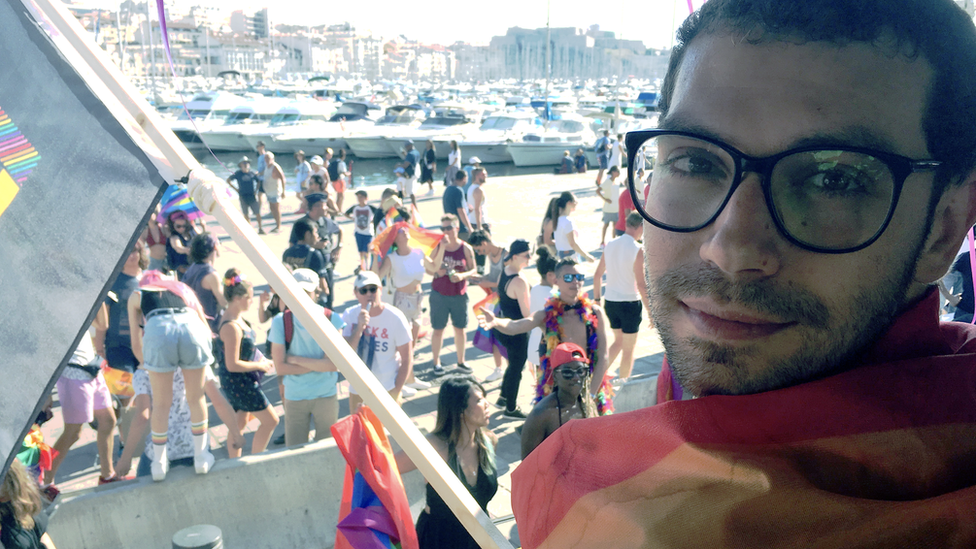
For the last two years, Hadi Damien's big plans for celebrating Pride in Lebanon have been destroyed.
In 2018, he was arrested and detained minutes into a recital of a play about homophobia.
He was released, but had to cancel the rest of the week-long Pride events he and his team had organised.
Then last year, the centrepiece concert of Beirut Pride had to be called off after violent threats were made against the venue and participants.
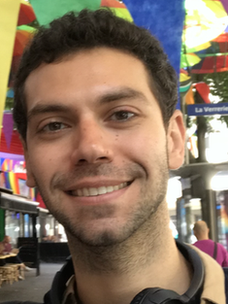
Hadi Damien at Pride in France
"The last two years have been a rollercoaster of emotions for me," said Hadi.
"We knew that it was going to be challenging to organise Pride in a country where LGBT status is criminalised but the funny thing is, despite all the hostility towards us, we never choose to cancel - it is always forced upon us."
At the start of 2020, Hadi and his team of volunteers were determined not to be put off and had begun to plan some Pride events when, once again, everything was cancelled.
This time though Hadi's difficulties were truly global.
'All you need is an internet connection'
The coronavirus pandemic has forced hundreds of LGBT groups to cancel thousands of events. But the solution to carrying on the celebrations, despite Covid-19, has the potential to not only be a technological triumph, but also to be a game changer for future Pride celebrations.
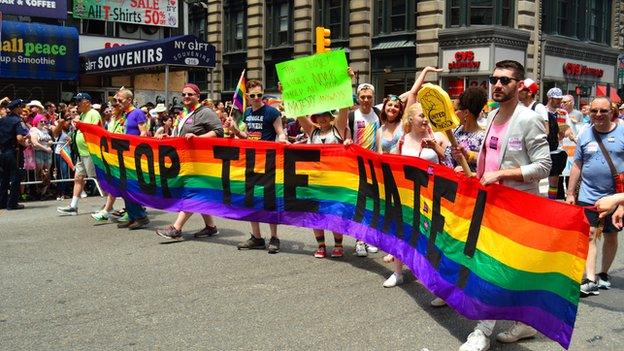
Pride march in New York, 2017
On Saturday, a 26-hour broadcast called Global Pride is being streamed on YouTube, Facebook and other social media platforms in a first for the Pride movement, which has been filling streets around the world with marches and rainbow flags since the 1960s.
In countries where access to mainstream social media is blocked, organisers are making sure people can tune in.
Cathy Renna from Inter Pride, one of the groups behind the event said: "Even in places like China and the Middle East where YouTube may be blocked, we have other streaming venues organised, like Revry which you can access through PlayStation.
Allow X content?
This article contains content provided by X. We ask for your permission before anything is loaded, as they may be using cookies and other technologies. You may want to read X’s cookie policy, external and privacy policy, external before accepting. To view this content choose ‘accept and continue’.
"All you need is an internet connection and you can experience this.
"I'm literally getting goosebumps as I say it, but we are going to be able to reach people in countries where it is a death sentence to be queer. This is a big silver lining to the awful situation of the pandemic."
The broadcast is a mixture of live and pre-recorded material that has been submitted since the project was launched in April.
Organisers, who are mostly volunteers, have curated more than 1,000 pieces of content sent in by supporters including singers and performers like Rita Ora, Pussy Riot, Dannii Minogue and LeAnn Rimes as well as political figures like US presidential candidate Joe Biden, Canadian Prime Minister Justin Trudeau and Irish Prime Minister Leo Varadkar.
Mapping virtual marches
Elsewhere tech giants including Facebook, Google and IBM have published a website called "Pride March From Home: United for Covid Relief".
People are being encouraged to map the route they would like to have marched if the pandemic wasn't stopping them, and then share it on social media.
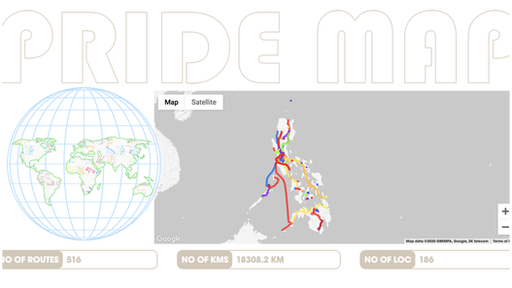
March For Pride map website
Rainbow-coloured lines snake across a world map, with new routes updated all the time. "Marchers" can make a donation that will go to LGBT communities affected by the coronavirus pandemic.
'A crime in 70 countries'
Amnesty International research suggests that same-sex sexual activity is a crime in 70 countries and is punishable by death in nine.
The human rights campaign group says even where these restrictive laws are not actually enforced, their very existence reinforces prejudice against LGBT people, leaving them feeling they have no protection against harassment, blackmail and violence.
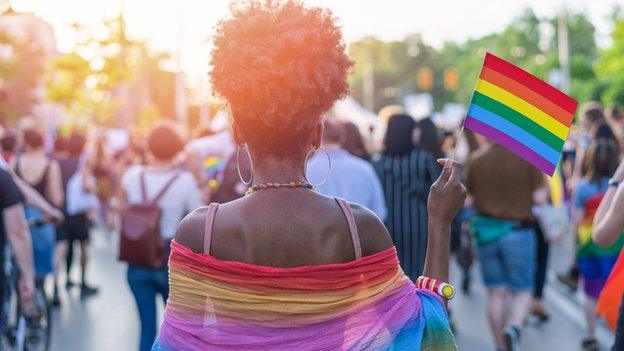
Thousands of Pride events have been cancelled because of coronavirus
Lebanon is one such country where homosexuality is criminalised. Article 534 of the Lebanese penal code prohibits "sexual intercourse between two people that is contrary to nature", although various courts have ruled it should not be used to arrest LGBT people.
Hadi Damien has attended Pride marches in France and the USA but feels like this is the first time he can have the same Pride experience as everyone else in the world despite the restrictions in his country.
He hopes it's a success and is built upon in normal times when the pandemic is over.
"It's so empowering. By submitting segments to the broadcast, young people from some of these countries are able to participate in a Pride event for the first time," he said.